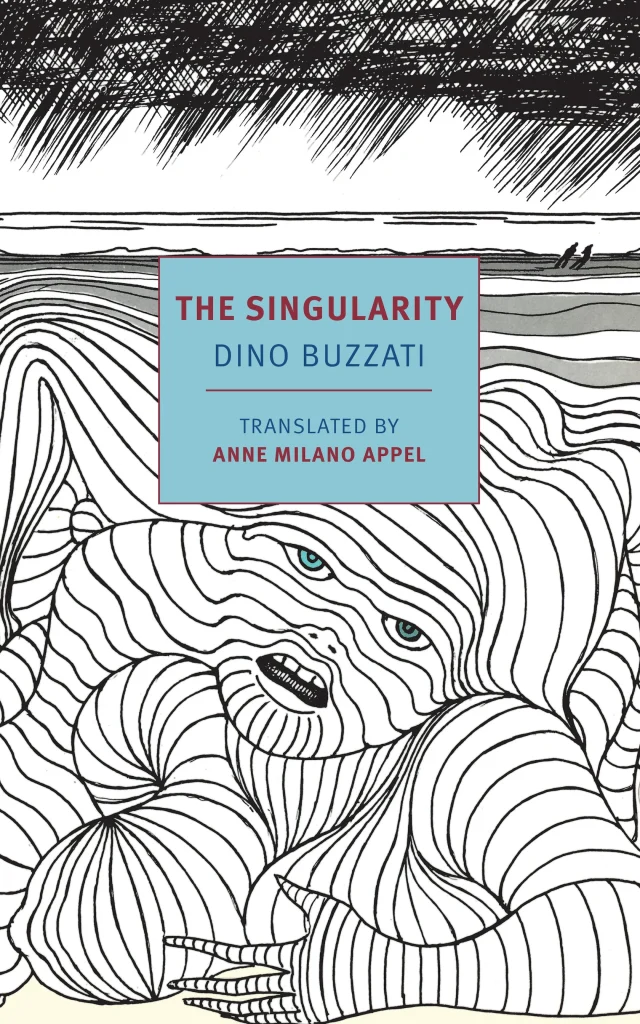
translated by Anne Milano Appel
original publication (in Italian): 1960
first English edition: 1962, Secker & Warburg (titled Larger Than Life)
this edition: 2024, NYRB Classics
136 pages
grab a copy here or through your local independent bookstore or library
*spoilers*
Not until a third of the way through this short, dark, mysterious novel do we get even a hint at what the strange government-run installation in the mountains is actually for. Even without knowing where he is going and why, Professor Ermanno Ismani willingly (if uncertainly) embarks on what will be a two-year scientific project. The Ministry of Defense has only said that the installation is crucial for the country and that he, as a professor of electronics, is duty-bound to lend his skills to the project.
When Ismani and his wife Elisa arrive at the mysterious site in the mountains, even the guards don’t know exactly what it’s for. Only when Ismani talks to the other scientists there (and there are only a few- Endriade, Strobele and his wife Olga, Manunta), does he begin to see that this sprawling endeavor is related to artificial intelligence. As Strobele (still only partially) explains, “[W]hat you are looking at is a kind of citadel…[a] little kingdom, hermetically closed off and apart from the rest of the world…to put it simply, this gigantic installation that so far has cost well over ten years of effort is…it’s related to us, it’s a human…A machine made in our likeness” (52).
Each day, a series of strange hums, clicks, sighs, crackles, and even a voice that isn’t quite a voice, floats over the installation, though only certain people can hear it. Endriade, who built it with the help of a brilliant scientist named Aloisi (who commits suicide before Ismani arrives), is able to work out a way to translate the various electrical impulses into intelligible speech. As he explains to Ismani and Elisa, the scientists didn’t give the installation language because it is a “trap for the mind,” and they wanted the artificial intelligence to grow far beyond human consciousness and intellectual abilities.
The scientists’ goal isn’t very clear–just a grand vision of intellectual evolution that will outstrip humanity and…do what? The air of mystery and dread that hangs over the novel from beginning to end makes the project seem downright sinister and potentially catastrophic.
When Elisa happens to see a photo of her old friend Laura in Endriade’s house, the latter winds up spilling the entire genesis of the project and his strange role in it. Laura had been Endriade’s wife, and despite her constant cheating and lying, Endriade had been deeply in love and even obsessed with her. After her fatal car accident a decade before, Endriade’s colleague Aloisi had come to ask him to work on a new kind of artificial intelligence. Still obsessed with Laura, Endriade was somehow able to resurrect her soul/personality/consciousness in the massive machine that they ultimately built within a cavern in the mountains. Buzzati keeps the explanation as to exactly how this was done very nebulous.
Somehow, Laura’s ebullient, joyous personality comes through in the atmosphere surrounding the installation, but it soon turns ugly when what Endriade had feared actually happens. One afternoon, Strobele’s wife, Olga, goes for a swim in a nearby lake and winds up parading her naked body in front of the walls of the installation, hoping to see what the artificial intelligence will do. She quickly realizes her mistake when a robotic arm shoots out from a section of the wall and tries to grab her (it ultimately grabs a passing rabbit and squeezes it to death).
What Endriade had feared–that Laura will remember what she was before, fully realize her new state as a static machine, and become enraged–is exactly what happens. The atmosphere changes–moans, cries, and whines fill the air of the mountains. Wishing to die, Laura then lures Elisa into her corridors and kills her, hoping that this will mean that the scientists shut her down permanently.
One might assume that Buzzati was using the story of the 14th century Italian poet Petrarch and his great love Laura as a basis for exploring the lengths that one might go for love. While Petrarch wrote immortal poetry for a woman he could never have, Endriade attempts to resurrect his own Laura and endow her with powers that no human could ever have. And yet, Laura’s self-consciousness and rage at being the only one of her kind and unable to experience human sensations ever again brings to mind Mary Shelley’s Frankenstein, as well.
Beautifully translated by Anne Milano Appel and a fascinating exploration of hubris and obsession, The Singularity is a must-read as we continue, in the 21st century, to strive for ever-more aware artificial intelligence and learn, at the same time, that we must tread carefully.

1 comment on “Review: The Singularity by Dino Buzzati”